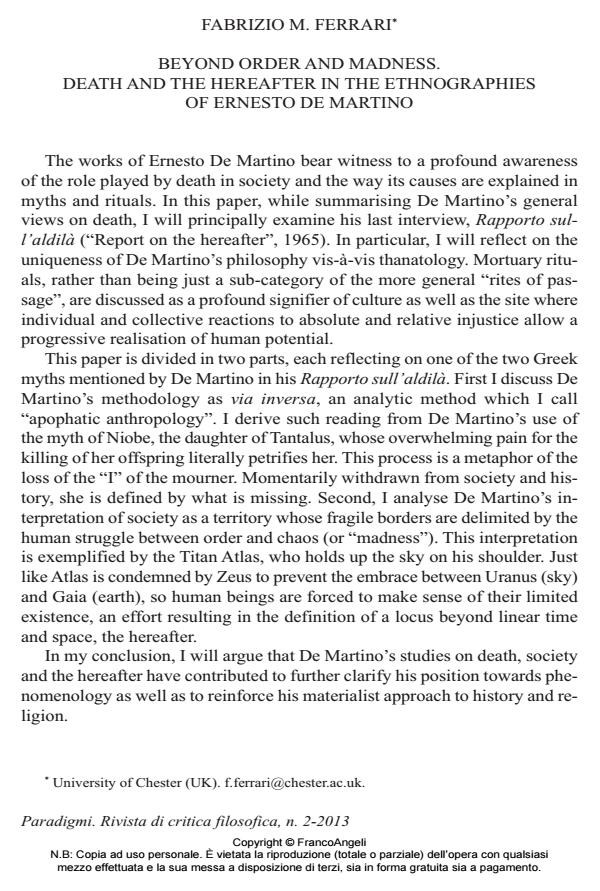Beyond Order and Madness. Death and the Hereafter in the Ethnographies of Ernesto De Martino
Journal title PARADIGMI
Author/s Fabrizio M. Ferrari
Publishing Year 2013 Issue 2013/2
Language Italian Pages 16 P. 51-66 File size 118 KB
DOI 10.3280/PARA2013-002005
DOI is like a bar code for intellectual property: to have more infomation
click here
Below, you can see the article first page
If you want to buy this article in PDF format, you can do it, following the instructions to buy download credits

FrancoAngeli is member of Publishers International Linking Association, Inc (PILA), a not-for-profit association which run the CrossRef service enabling links to and from online scholarly content.
The paper discusses the views of Ernesto De Martino on thanatology. Although De Martino worked extensively of mortuary rituals and myths and beliefs related to death, little has been said about his last interview, Rapporto sull’aldilà ("Report on the hereafter"). The author explores here the philosophical and anthropological argument of De Martino vis-à-vis themes such as ritual, presence and labour, and the way they relate to death as a cultural construction. Borrowing from Marxist anthropology and continental philosophy, the paper argues that De Martino was eventually sceptical of classic phenomenology and developed a philosophical approach which was deliberately polemic towards the dominating ideology of the 1950s and 1960s academic study of religion.
L’articolo intende discutere la posizione di Ernesto De Martino nel campo della tanatologia. Sebbene De Martino abbia indagato temi quali rituali funebri, miti e credenze relative alla morte in gran parte della sua produzione scientifica, poco è stato detto circa la sua ultima intervista, il Rapporto sull’aldilà, apparso postumo nel 1965 su L’Europeo. In questo articolo, l’autore analizza il pensiero filosofico e antropologico di De Martino rispetto a te- matiche a lui care (presenza, rito, mito, lavoro) e il modo in cui si interfacciano al tema della morte nel sociale. Basandosi su una metodologia costruita sull’antropologia Marxista e la filosofia post-strutturalista, l’autore analizza la critica di De Martino al pensiero fenomenologico corrente ed sostiene che l’analisi sulla morte e aldilà permette una più chiara presa di coscienza del radicalismo demartiniano in merito a temi di ordine sociale.
Keywords: Apophaticism, death, hereafter, Marxist anthropology, phenomenology, thanatology.
Fabrizio M. Ferrari, Beyond Order and Madness. Death and the Hereafter in the Ethnographies of Ernesto De Martino in "PARADIGMI" 2/2013, pp 51-66, DOI: 10.3280/PARA2013-002005